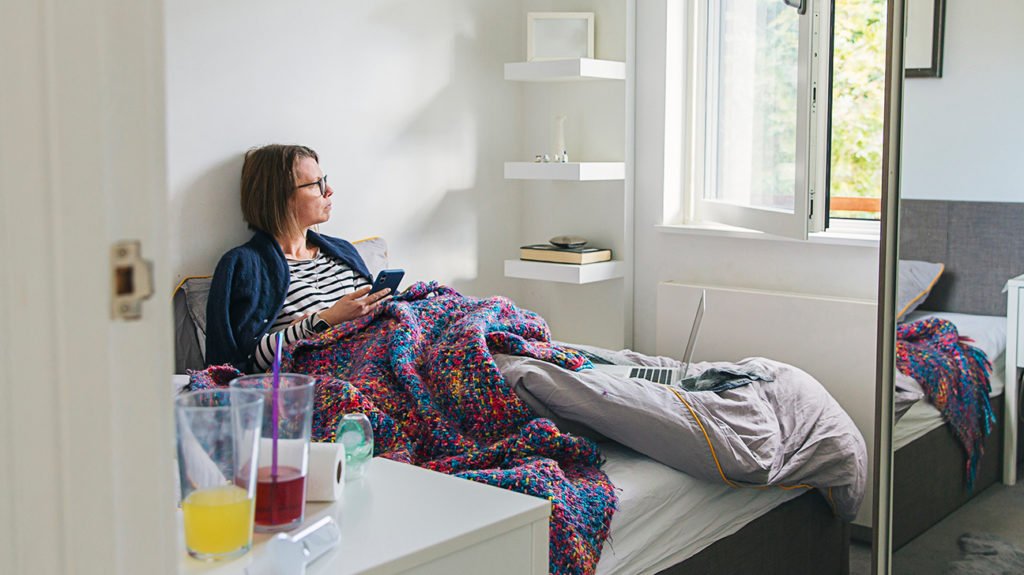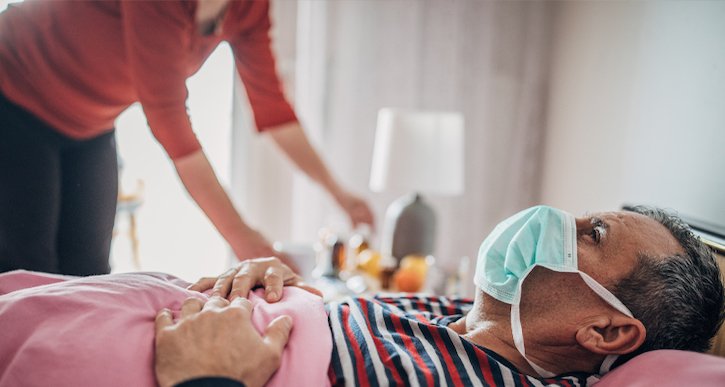Taking charge of caring for a Covid-19 patient at home? How to keep everyone safe and care for the patient at the same time? Will my entire family members be infected? Fret not, we are here to give you some tips on how to take care of a sick person at home.
By now, you would have performed your RTK Antigen or RT PCR test whereby the results turned frightfully positive. Follow the advice below and you will know what to prepare to protect yourself and your loved ones.
- Tips No.1: Separate Bedroom
The patient should be quarantined and rested in a separate bedroom (e.g. guest bedroom). He needs to stay in the room alone, as much as possible to avoid spreading the virus. The patient will need his phone or a TV for entertainment. He should also eat (or be fed) in his room, using disposable tableware. Avoid sharing any personal items (e.g towels, bedding).
- Tips No.2: Own Trash Can
He will need his own trash can with a liner (plastic bag) and best if it comes with a lid (cover), for tissues, paper plates, cups, and any other trash.
- Tips No.3: Keep Pets (if any) and Visitors Away
Keep any pets away from the patient and outside of the bedroom. Family and friends who stop by should stay outside of the house, keeping their social distance.
- Tips No.4: Ventilation

When the weather is nice, the patient can open his bedroom window. A breeze keeps the virus from lingering in the room’s air and helps to prevent the spread to others who come in.
- Tips No.5: Separate Bathroom
The patient should also have his own dedicated bathroom. After each use, he needs to wash his hands for 20 seconds with a soup, making sure that he cleans his nails, thumbs, and the top of his hands. He should then dry them with a clean paper towel and wipe the bathroom (e.g toilet seat, flush, and faucet) with disinfectant after each visit.
- Tips No.6: Face Mask
The patient should keep his mask on as much as possible if it does not restrict his breathing. The caregiver should also put on a face mask, face shield, and a pair of disposable gloves when entering the patient’s room. Take extra caution when touching the patient, his surroundings, or the things (e.g drinking water, bedding, laundry) that contain his bodily fluids (e.g saliva, mucus, vomit, urine, blood, stool).
- Tips No.7: Disposing of Trash
Proper handling and disposal of trash are very important to prevent the spread of the virus. Make sure to wear a pair of gloves when handling the patient’s trash, and double bag it before tossing it into normal trash pick up.
- Tips No.8: Laundry
The same goes with handling the patient’s laundry. Make sure to wash them separately, in the hottest possible water temperature, and dry them well. Caregivers should also wear a pair of disposable gloves when handling the patient’s laundry and dispose of them immediately after use. Wash your hands for 20 seconds with soap, then carefully remove your face mask without touching the front. Wash your hands again and dry them with a clean dry towel. Use a new pair of gloves and face mask each time you enter the patient’s room or touch any of his things, and clean your hands after taking off the gloves and face mask.
- Tips No.9: Disinfect the House
After moving the patient to a separate bedroom, other household members need to start disinfecting the whole house. You can also opt for professional help by engaging with home disinfection services. They usually come with a team of disinfection specialists that follow MOH & DOSH guidelines. They also use disinfection chemicals approved by KKM, so you can have more confidence that your home is safe from harmful viruses.
- Tips No.10: Disinfect Other Objects
Each day, household members should disinfect high-touch surfaces like doorknobs, light switches, handles, appliances, countertops, staircase railings etcetera. Because when Covid-19 patients cough or exhale, they release droplets of infected fluid. These droplets will fall on nearby objects and people could get infected by touching these contaminated surfaces, and then touching their eyes, nose, or mouth. You can choose to use wipes and sprays with at least 70% alcohol for smaller objects like phones, remote controls, laptops, or any electronic appliances
- Tip 11: Homemade Disinfectant Recipe
What should you do if you haven’t got any proper disinfectant chemicals? If you urgently need a disinfectant, you can make your own by mixing ⅓ cup of bleach with 1 gallon (3.8 litres) of water. It is proven effective against coronavirus.
- Tips No.12: Monitor Patient Daily
As a caregiver of a Covid-19 patient, you will need to check on the patient daily to see if he is getting better or worse. Contact your doctor if you have any concerns or doubts. If the patient has trouble breathing or starts to develop any other serious symptoms like chest pain, call the ambulance immediately. The caregiver should inform the person on the phone that there is a covid-19 patient at home. While waiting for the arrival of the paramedics, the patient should put on a face mask and face shield.
Final tips for caregivers themselves
Finally, caregivers should continue to stay at home for another 14 days after their last contact with the patient. It’s definitely not easy to be caring for a Covid-19 patient in a non-hospital setting, but with proper steps and care, most people with coronavirus can recover well at home. Be sure to take ample rest in between, eat well and drink plenty of water.
On that note, if you were unfortunate to get infected, beware of the long term effects of COVID-19. This phenomenon is called long COVID. You can contact us if you require further assistance.





4 thoughts on “12 Tips To Care For Someone With Covid-19 At Home”
Pingback: Bagaimana untuk menjaga seseorang yang mempunyai Covid-19 di rumah? – QM HEALTH
Pingback: Things to do when you suspect you have COVID-19 infection. – QM HEALTH
Pingback: COVID-19 Care (Recovery Tips) – QM HEALTH
Pingback: COVID-19 Vaccine Myths Debunked – QM HEALTH